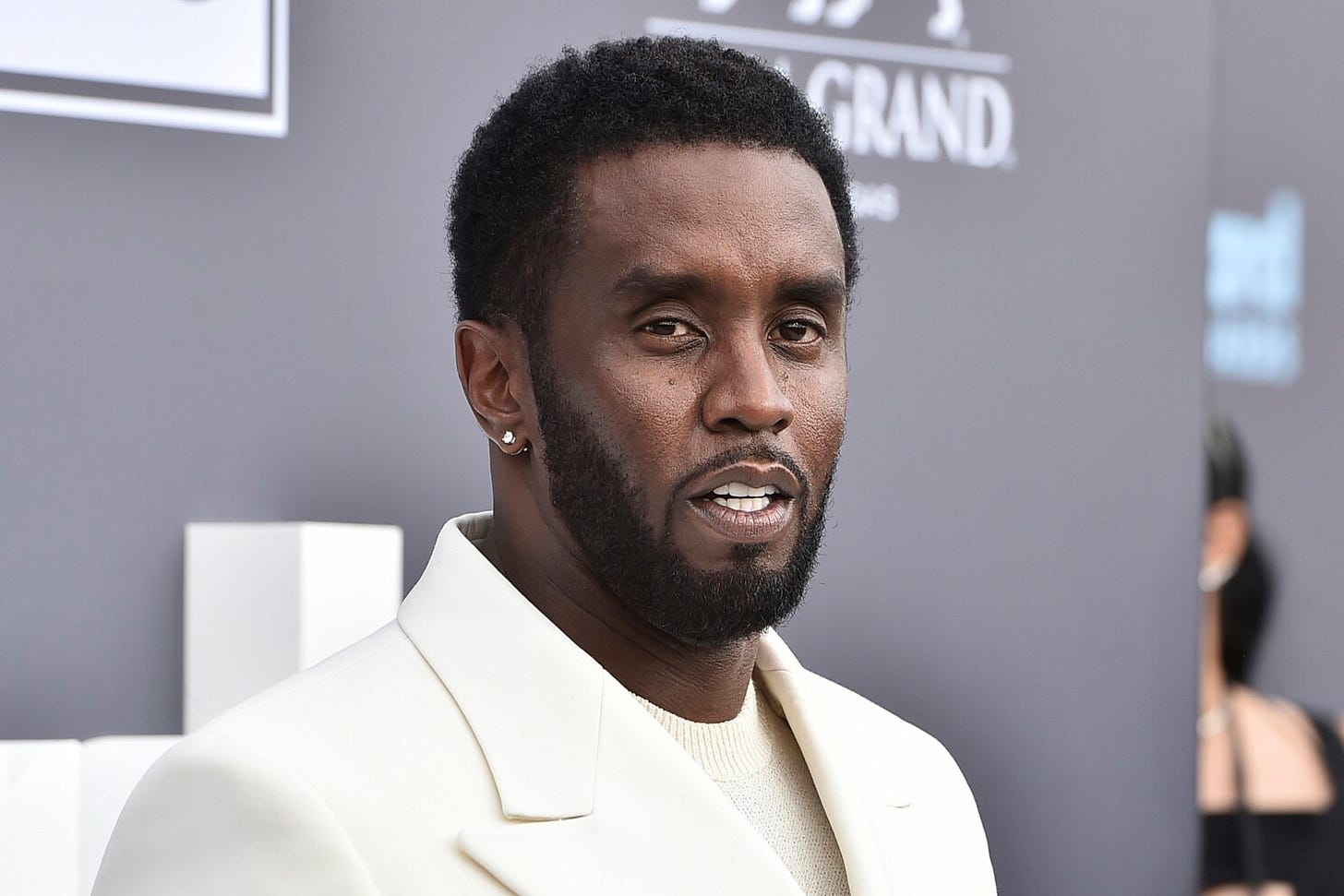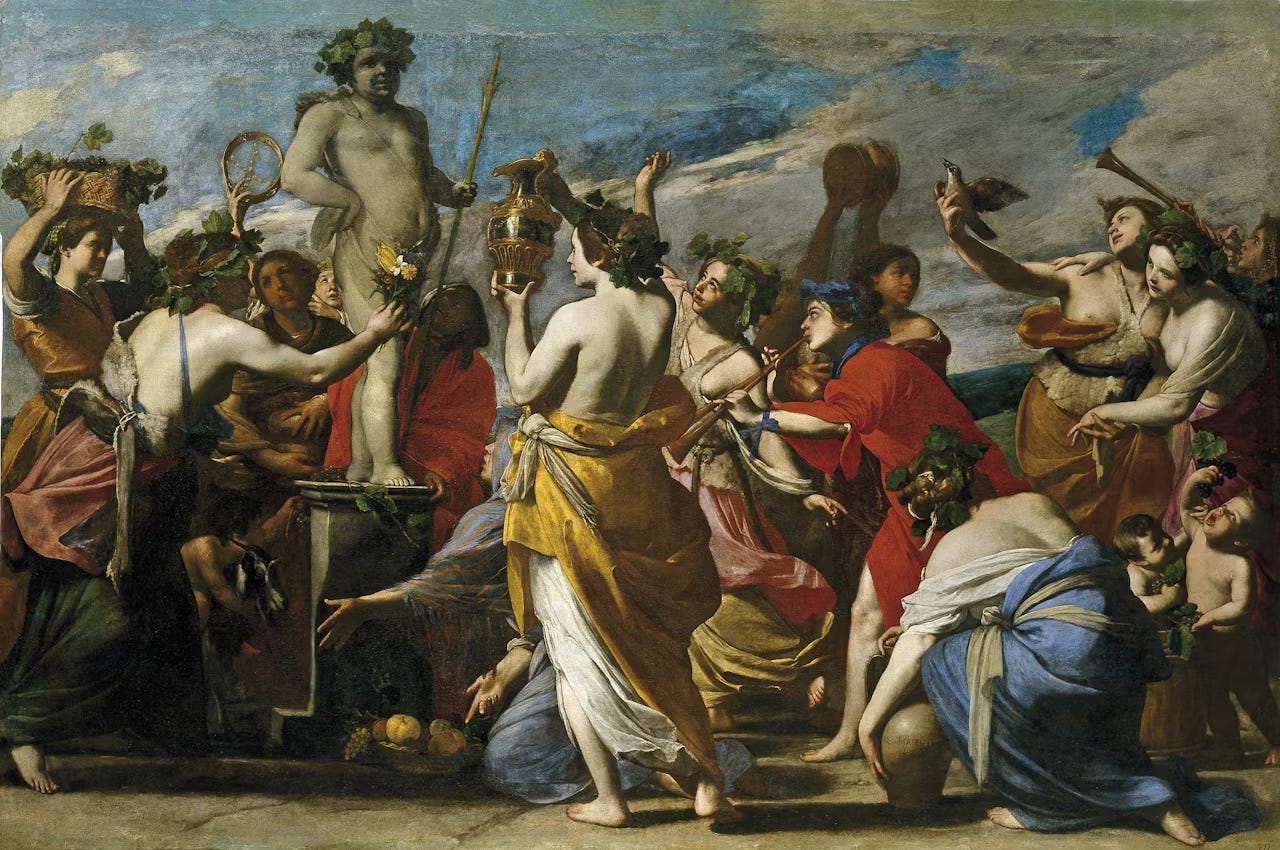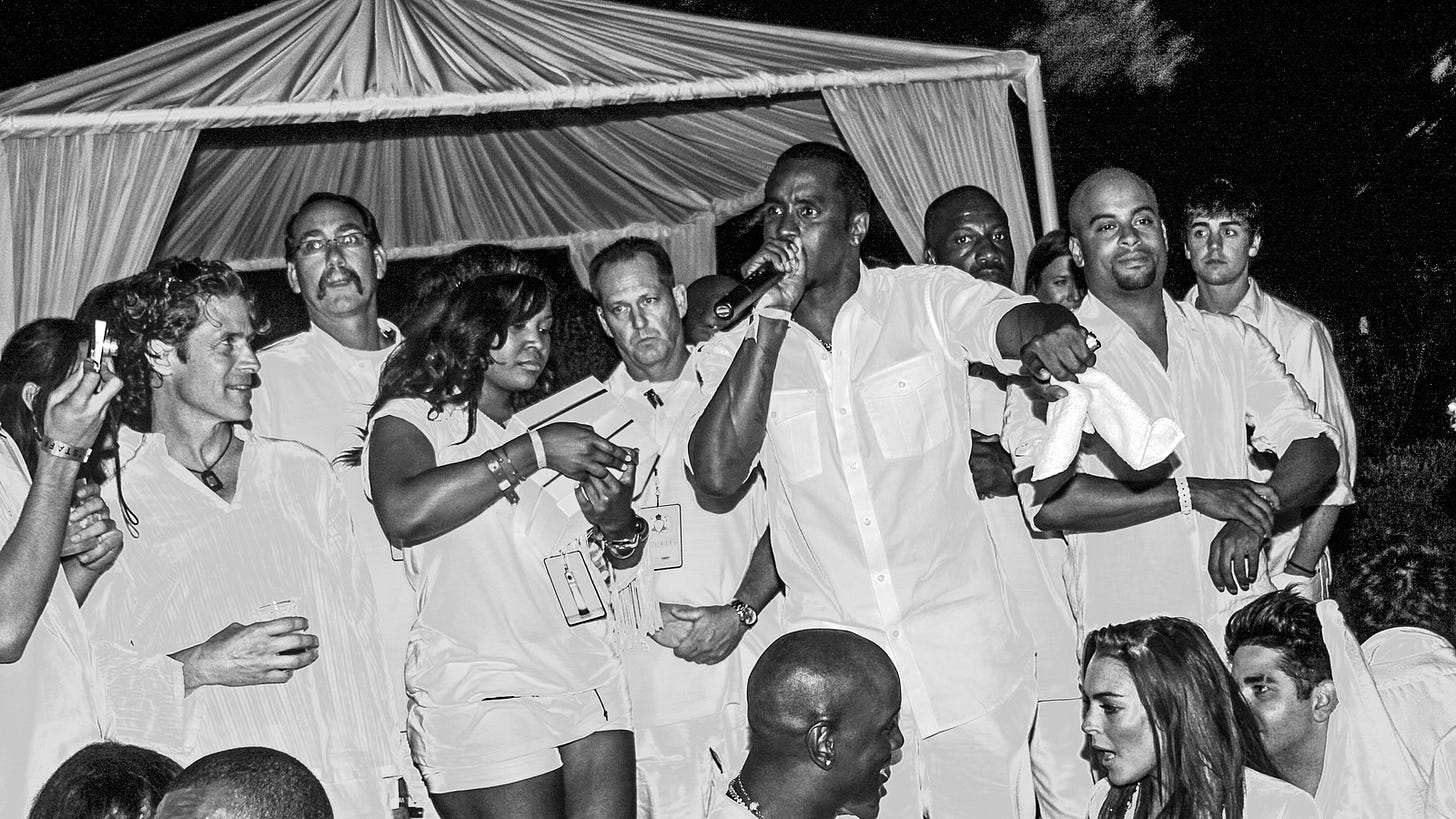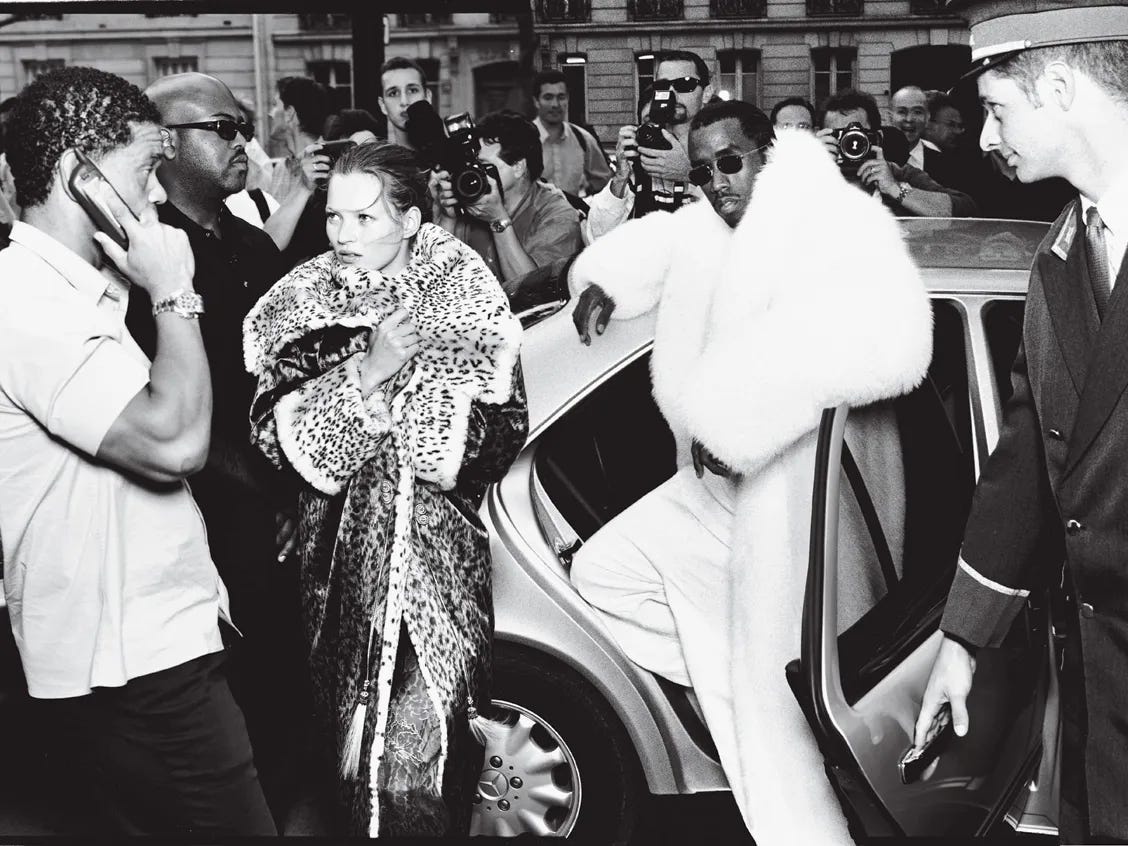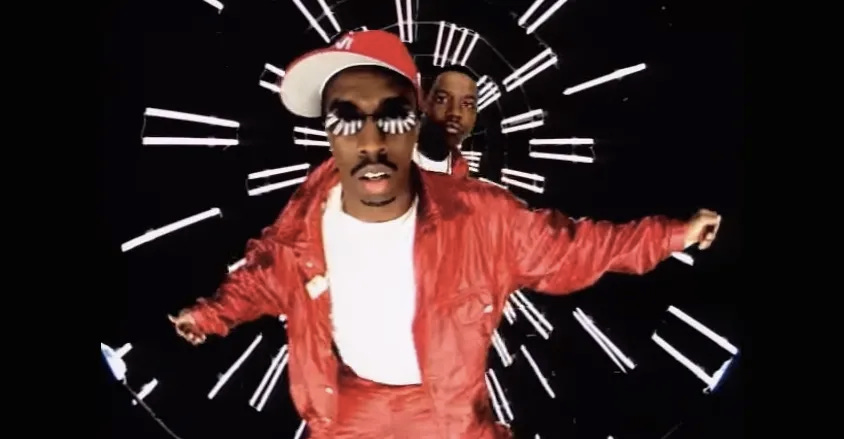Diddy and Dionysus: Parallels of Power, Pleasure, and Fall
The Rise, Reign, and Reckoning of Two Icons of Ecstasy and Power
I recently came across the term Euhemerism, which suggests that myths were originally based on real historical events or people. Essentially, it argues that, over time, real figures and events become exaggerated and transformed into myths, with each retelling reflecting the values and beliefs of the culture. The theory is named after Euhemerus, a Greek mythographer from the late 4th century BC, and in works like Bulfinch's Mythology, it’s often referred to as the "historical theory" of mythology.
However, what I want to explore here isn't quite that. Instead of looking at mythological gods as products of real historical figures, I want to consider someone who seems to have taken on the essence of a mythological god in the modern world. That person is P. Diddy, and the god in question is Dionysus.
While I’m drawing a comparison between Diddy and Dionysus, it’s important to acknowledge that both figures are complex and cannot be reduced to simple parallels. However, their similarities—particularly in their roles within culture, power, and excess—are worth exploring.
Who are They?
Dionysus, the Greek god of wine, theatre, and ecstasy, epitomised celebration and vitality. Though his domain extended beyond agriculture to the mysteries of the soul and spirit, his influence came at a cost. Known for his dual nature, Dionysus offered joy but was also feared for the unrestrained madness he inspired.

In his heyday, Sean “Diddy” Combs—known variously as Puff Daddy, P. Diddy, and just Diddy—was a music industry titan, building a legacy as a record producer, entrepreneur, and icon. Once revered for his musical genius and ability to launch the careers of iconic artists like The Notorious B.I.G. and Usher, he wielded immense power and influence. Yet now, awaiting trial on charges of racketeering conspiracy and sex trafficking, he’s seen as a fallen figure, a man once idolised but now questioned, with his legacy in tatters.
As we peel back the layers of these two figures, intriguing parallels emerge—parallels that reveal not only their larger-than-life influence but also the dangers of unchecked power and indulgence.
(Fallen) gods
In the pantheon of Greek deities, Dionysus reigned as a god whose rituals liberated his followers from the everyday, offering divine possession and ecstatic freedom. As Pseudo-Apollodorus notes in the Bibliotheca (2.37), "With events like these, men learned that Dionysos was a god, and they began to honour him." In the Homeric Hymn 26 to Dionysus, he is described as the "splendid son of Zeus and glorious Semele," highlighting his divine parentage and exalted status. Yet, over time, Dionysus has transformed from a figure of worship to one remembered in stories and plays, honoured only by those who still practice pagan traditions. His once-glorious status has eroded, and most now see him as a mythological relic rather than a god to whom they turn for transcendence.
Similarly, Diddy’s status as an icon has suffered a steep decline. While he was once a celebrated figure idolised by fans and peers alike, his recent allegations have stripped away much of the admiration he once commanded. Nevertheless, as with Dionysus, he retains a devoted following—people who refuse to accept his fall, clinging to his past achievements and personal charisma. Their loyalty underscores the persistence of "celebrity worship" in modern society, showing that the allure of a revered figure remains strong even when that figure is no longer universally lauded. In a world where celebrities are often treated as gods, Diddy’s fall highlights how even the mightiest figures can become cautionary tales.
What’s in a name?
The epithets associated with Dionysus reflect the multifaceted nature of his mythology and worship, encompassing various aspects of his identity and divine attributes. From Acratophorus, the "giver of unmixed wine," to Lysius, the "deliverer" or "releaser," each epithet offers insight into different facets of Dionysus's character and significance within ancient Greek religion. As Ovid describes in the Metamorphoses (4.14 ff), the Boiotian Bacchantes called on Dionysus by "his many noble names: Lyaeus, Bromius; child of flaming fire; alone twice mothered and alone twice born; great lord and planter of the genial grape; Nyseus too, and Lenaeus and Thyoneus, whose locks are never shorn; Nyctelius, Iacchus, Euhan, father Eleleus; and all the countless titles that are yours, Liber, throughout the lands of Greece."
Similarly, Diddy’s evolution of names over the years reflects his own multifaceted identity and career trajectory within the music industry. From his childhood nickname “Puffy” to the business-savvy “Sean John,” and finally the iconic “Diddy,” each name represents a chapter in his personal and professional journey. Just as Dionysus assumed different epithets in various contexts, Diddy’s many names speak to the complexities of fame, reinvention, and self-representation in the world of celebrity culture.
Party Up
Both Dionysus and Diddy are avatars of revelry, each commanding a cult-like atmosphere around celebration. Dionysus’s domain was one of wild bacchanalia, where his followers, the maenads, let loose in drunken abandon, abandoning social norms. These rituals encouraged people to lose themselves, transcending individual identity and uniting in ecstasy—a liberation that could easily spiral into danger and chaos. This wild and intoxicating nature of Dionysus’s celebrations can be traced back to his initiation into the mystic rites taught to him by Rhea-Cybele in Phrygia. According to Pseudo-Apollodorus in the Bibliotheca (3.33), Dionysus was purified by Rhea and learned the mystic rites of initiation, after which he set out eagerly, equipped with the sacred gear, to spread his revelatory practices through Thrace. His initiation into these rites cemented his role as the god of ecstasy, and his followers’ unrestrained behaviour reflected the intense, chaotic freedom he embodied.
Similarly, Diddy’s parties were legendary, extravagant affairs where celebrities gathered in an atmosphere of power and privilege, embodying Dionysian excess. For a time, his influence over revelry was unmatched, his gatherings synonymous with the high life. But beneath the glamour lay a darker side, with rumours of secret gatherings known as “freak-offs,” events shrouded in mystery where boundaries were blurred and personal control could vanish in the face of luxury and indulgence.
Just as Dionysus’s bacchanals could turn violent and uncontrollable, Diddy’s celebrations began to reveal darker undertones of manipulation and exploitation, leading to troubling allegations and his eventual downfall. The image of Diddy, once seen as a celebrant of life and creativity, now carries a sense of foreboding, as if echoing the destructive abandon of Dionysian revelries gone too far.
The World of Spirits
Dionysus, the god of wine (Euripides, Bacchae 235), was revered for his ability to intoxicate, connect, and liberate people from their inhibitions. His name became synonymous with wine’s dual nature—both a joy and a potential danger. Just as Dionysus’ followers were drawn into wild, uninhibited revelry, today's fans are often swept up in the lavish and chaotic world of celebrity, where the lines between devotion and destruction become dangerously blurred.
Moreover, Diddy’s ventures in the alcohol industry, from his iconic endorsement of Cîroc vodka to popularising cognac in hip-hop with the hit “Pass the Courvoisier” alongside Busta Rhymes, made him synonymous with high-life indulgence. Through these brands, he helped bring spirits to a wider, more youthful audience, integrating them with his glamorous image and making them ubiquitous in hip-hop culture.
Ecstasy and Hedonism
The allure of unrestrained ecstasy is central to both Dionysus and Diddy’s stories, highlighting the dangers of hedonism. Dionysus was worshipped as the god of ecstasy and trance, leading his followers to lose themselves in rapturous abandon. The Orphic Hymn to Dionysus describes him as a "furious inspirer" and "bearer of the rod," highlighting his ability to provoke intense, uncontrolled emotions in his devotees: "Bakkhos (Bacchus) famed... who swords and blood and sacred rage delight" (Orphic Hymn 45, trans. Taylor). These ecstatic experiences were not merely celebratory, but could take on a violent and uncontrollable nature, as Dionysus was revered for inducing a frenzy that defied the boundaries of normal human behaviour.
However, surrendering to Dionysian madness was fraught with danger. Ancient stories often warned of the destructive consequences of excessive indulgence. For example, in Pseudo-Apollodorus's account, when the people of Thebes failed to honour Dionysus, the god punished them by sending his followers into a frenzied madness: "After Dionysos had demonstrated to the Thebans that he was a god, he went to Argos where again he drove the women mad... and up in the mountains the women fed on the flesh of the babies suckling at their breasts" (Bibliotheca 28.37). This horrific image of Dionysian excess serves as a stark reminder that while the god offered ecstatic liberation, it also carried with it the potential for chaos and destruction. His power to provoke madness and his unpredictable nature made Dionysian worship both alluring and perilous, embodying the thin line between ecstatic release and violent ruin.
Diddy, too, embodied a lifestyle of excess and indulgence, reveling in wealth, luxury, and fame. His notoriety was built on extravagant parties and the glamour of the high life, but the darker side of this world cannot be ignored. Diddy’s connection to excess extends to the notorious drug "pink cocaine"—a synthetic substance tied to the culture of indulgence and manipulation surrounding his world. Marketed as a fun party drug, it has been linked to troubling allegations, including a lawsuit claiming Diddy’s employees were required to keep it on hand for him at all times. As a Rolling Stone report notes, three women have come forward with allegations against the mogul, hoping to hold him accountable for years of alleged unchecked behaviour. This aspect of fame underscores the dangerous fallout of a hedonistic lifestyle spiraling out of control, offering a cautionary tale akin to the chaotic power of Dionysus.
Gotta have an entourage
In Greek mythology, Dionysus was often accompanied by maenads and bacchants who worshipped him with abandon. Their intoxicated, celebratory gatherings, while seeming joyous, sometimes erupted in violence, illustrating the darker sides of devotion and surrender. His followers were devoted, yet controlled, entirely beholden to the power of their god.
Similarly, Diddy’s associations with an entourage and high-profile companions once seemed part of his glamorous image. But now, allegations have exposed the sinister undertones of this devotion. Accounts of abuse, manipulation, and exploitation suggest a darker undercurrent, where people were drawn to him by wealth and influence, only to become trapped in the power dynamics he orchestrated. This echoes the power Dionysus held over his followers, blurring the lines between liberation and control.
Performance, darling
Greek drama, which originated from the dithyrambic choruses at Dionysian festivals, led to Dionysus being revered not only as the god of wine and revelry but also as the patron of tragedy and protector of theatres. His Great Dionysia festival in Athens celebrated the transformative power of storytelling, an art form through which society explored themes of tragedy, comedy, and life’s dualities. Diddy, too, shaped cultural narratives, from his music and television ventures to his entrepreneurial pursuits. For years, he was celebrated as an innovator, helping to define and elevate hip-hop culture.
Conclusion: A Tale of Two Myths
The comparison between Dionysus and Diddy offers a complex view of fame, power, and the inevitability of fall. Dionysus, once worshipped as a god, is now remembered more for his mythic qualities than as a figure of devotion, his worship confined to the margins of society. Diddy, who once seemed untouchable, now faces the public’s scorn, his influence eroded by scandal. The allure that each figure held was compelling, yet their stories both caution against the perils of unchecked power, indulgence, and the darker forces that come with devotion.
This exploration shows how, even in the 21st century, the essence of mythological figures still shapes and mirrors our cultural narratives, reflecting the timeless human fascination with power, transformation, and the dark side of adoration.
In both the ancient world and today's celebrity culture, figures like Dionysus and Diddy embody the human desire to both idolise and fear those who seem to possess immense power. Just as Dionysus’ cult inspired both devotion and madness, modern celebrity worship often mirrors this dynamic. Society elevates figures like Diddy, granting them the status of gods—adored, admired, and ultimately scrutinised when their excesses become too great to ignore.
In the case of Dionysus, it was the destructive chaos of his revelry; in Diddy’s case, it is the consequences of his violence, excesses and exploitation. Both serve as cautionary tales of the dangers of idolising figures who walk a fine line between the divine and the destructive.


